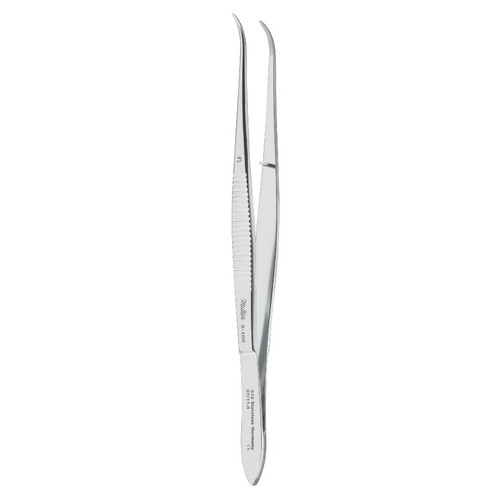- Used in a variety of medical procedures, including dental and oral surgery
Uses
- Can be used for a variety of tasks where precise handling and grasping of materials are needed
- Dressing wounds:
- Used to handle dressings, sponges, or other materials used for wound care
- Tissue manipulation:
- Gently grasps and manipulates delicate tissue during procedures in dental, plastic, and general surgery
- Suturing:
- Can be used to help hold or tie sutures
- Foreign object retrieval:
- The fine tips allow for the retrieval of small foreign objects from wounds or cavities
Benefits
- Precise control:
- The 6-inch length and fine, serrated tips allow for a secure and controlled grip, which is essential for delicate procedures
- Durability:
- The high-quality stainless steel and German craftsmanship ensure the instrument will withstand repeated use and sterilization
- Versatility:
- The instrument's design makes it useful for multiple applications across different medical specialties
Features
- High-quality stainless steel:
- Like most Miltex instruments, the Semken Dressing Forceps are expertly crafted from surgical-grade stainless steel
- German craftsmanship:
- Miltex instruments are manufactured by skilled craftsmen in Germany to exacting specifications
- Serrated tips:
- The serrated tips provide a secure, non-traumatic grip on tissue or dressings
- Standard grade:
- The forceps meet standard-grade specifications for surgical instruments
- Reusable and autoclavable:
- Designed to be sterilized and reused, making them a durable and long-lasting tool
- Corrosion-resistant:
- A passivation process helps protect the instrument against corrosion from repeated sterilization
Care and handling
- Sterilization:
- The forceps are autoclavable, but proper cleaning and sterilization procedures must be followed to maintain their condition and ensure patient safety
- Maintenance:
- Regular maintenance, including lubrication of the joint, can help ensure smooth operation and extend the life of the instrument
- Inspection:
- The instrument should be regularly inspected for wear, damage, or corrosion, as these can affect its function and safety







